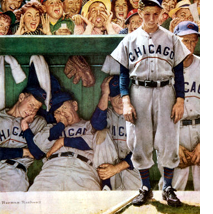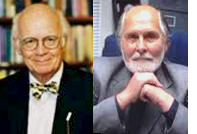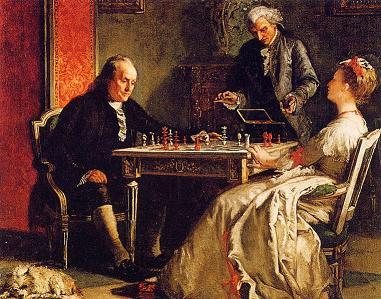Stinkin' it up
 This holiday weekend Eric Wittenberg and I made great strides in preparing our deliverable manuscript for You Stink! Major League Baseball’s Terrible Teams and Pathetic Players. We are nearly done with our edits and are now working with the Baseball Hall of Fame on image acquisition. This project truly is a labor of love and we are thrilled that The Kent State University Press has decided to publish it. Due to space constraints, Eric and I decided to keep the most pertinent statistics in the book and make the complete stats available online as a free PDF download. We also trimmed out some stories that we felt were a bit of a stretch. Here’s what made the final cut:
This holiday weekend Eric Wittenberg and I made great strides in preparing our deliverable manuscript for You Stink! Major League Baseball’s Terrible Teams and Pathetic Players. We are nearly done with our edits and are now working with the Baseball Hall of Fame on image acquisition. This project truly is a labor of love and we are thrilled that The Kent State University Press has decided to publish it. Due to space constraints, Eric and I decided to keep the most pertinent statistics in the book and make the complete stats available online as a free PDF download. We also trimmed out some stories that we felt were a bit of a stretch. Here’s what made the final cut:
You Stink! Major League Baseball’s Terrible Teams and Pathetic Players
CONTENTS
Foreword by Dave Raymond (The Philly Phanatic)
Introduction “Monument to Mediocrity”
TERRIBLE TEAMS:
Overview: Criteria, Teams, MLB All-Time Worst Records
1. NOT LOUISVILLE SLUGGERS: The 1889 Louisville Colonels
2. BAD NEWS BROWNIES: The 1898 St. Louis Browns
3. SQUASHED LIKE A BUG: The 1899 Cleveland Spiders
4. “ET TU, BRUTE?”: The 1904 Washington Senators
5. THE CURSE CONTINUES: The 1932 Boston Red Sox
6. EVEN THE BABE COULDN’T SAVE THIS ONE: The 1935 Boston Braves
7. FROM DYNASTY TO DESPAIR: The 1916 Philadelphia Athletics
8. 62.5 GAMES OUT OF FIRST PLACE: The 1942 Philadelphia Phillies &
A MAJOR LEAGUE RECORD 23 STRAIGHT LOSSES: The 1961 Phillies
9. AT LEAST THEY WERE CONSISTENT: The 1950-1954 Pittsburgh Pirates
10. THE WORST RECORD OF THE MODERN ERA: The 1962 New York Mets
11. ONE YEAR OF WRETCHEDNESS: The 1969 Seattle Pilots
12. IN NEED OF FORGIVENESS: The 1973 San Diego Padres
13. FUNDAMENTALLY FLAWED: The 1988 Baltimore Orioles
14. A COMPLETE MASSACRE: The 1991 Cleveland Indians
15. SCAREDY CATS: The 2003 Detroit Tigers
HALL OF SHAME:
1. Worst Season: FROM HEROES TO ZEROS: The 1884 Wilmington Quicksteps
2. Worst Investment: MONEY FOR NOTHING: $100M 2008 Seattle Mariners
3. Worst Collapse: ROTTEN TO THE (BIG APPLE) CORE: The 2007 New York Mets
4. Worst Pitching Staff: SCORING TEN RUNS A GAME BUT STILL LOSING: The 1930 Philadelphia Phillies
5. Worst Scandal: CHEATERS NEVER WIN: The 1919 “Black Sox” Scandal
6. Worst Call: *61 IN ’61: Maris Gets the Asterisk
7. Worst Team Year in and Year Out: ABANDON SHIP: The Pittsburgh Pirates and 17+ Straight Losing Seasons
8. TOP 10 WORST PLAYS:
1. Buckner’s Blooper
2. Fred Merkle’s Boner
3. Pete Rose Ruins Ray Fosse
4. George Brett’s Pine Tar Incident
5. Cap Anson’s Racist Reluctance
6. Players’ Strikes (’72, ’81, ‘94)
7. Mickey Owen's Passed Ball
8. Babe Slugs Umpire Brick Owens
9. Disco Demolition Debacle
10. Brooklyn Dodgers Go West
9. WORST PLAYERS
1. BATTER: Bill Bergen
2. PITCHER: Jim Hughey
3. CATCHER: John Humphries
4. FIELDER: Tony Suck
5. GRAND “CHAMPION”: Clarence “Choo Choo” Coleman
6. OWNERS: The Not-So-Mighty Quinns
10. DISAPPOINTMENT ON THE DIAMOND: A Timeline of Terribleness
11. NOTABLE QUOTABLES: Lines about Losing…
This title will be released in time for the 2012 season. Stay tuned as Eric and I will periodically update you on this unique project as it advances through the publishing process.
Religious Freedom Celebration Keynote Lecture
William M. Beck, a former mayor of Fredericksburg and member of the Fredericksburg Council of The Virginia Statute for Religious Freedom recently penned a letter to The Free Lance-Star announcing an upcoming event that I would like to share. He wrote:
 On Friday, Jan. 21, at 7:30 p.m., two esteemed religious scholars will speak at UMW's Dodd Auditorium to discuss Thomas Jefferson's "Virginia Statute for Religious Freedom" and its meaning for our world. Martin E. Marty (left), professor emeritus of the history of modern Christianity at the University of Chicago, and Seyyed Hossein Nasr (right), university professor of Islamic studies at George Washington University, are uniquely qualified to comment on religious freedom from the different perspectives of Islam and Christianity. Certainly, Jefferson envisioned such discussions when he said that his statute was meant "to comprehend, within the mantle of its protection, the Jew and the Gentile, the Christian and Mahometan, the Hindoo, and infidel of every denomination." This year's program is the latest in an annual series presented by the University of Mary Washington, with support from the community (More Details Here).
On Friday, Jan. 21, at 7:30 p.m., two esteemed religious scholars will speak at UMW's Dodd Auditorium to discuss Thomas Jefferson's "Virginia Statute for Religious Freedom" and its meaning for our world. Martin E. Marty (left), professor emeritus of the history of modern Christianity at the University of Chicago, and Seyyed Hossein Nasr (right), university professor of Islamic studies at George Washington University, are uniquely qualified to comment on religious freedom from the different perspectives of Islam and Christianity. Certainly, Jefferson envisioned such discussions when he said that his statute was meant "to comprehend, within the mantle of its protection, the Jew and the Gentile, the Christian and Mahometan, the Hindoo, and infidel of every denomination." This year's program is the latest in an annual series presented by the University of Mary Washington, with support from the community (More Details Here). As my latest long-term book project, Faith and Freedom in Fredericksburg: Thomas Jefferson and the Virginia Statute of Religious Freedom, examines Jefferson’s experiences here in Fredericksburg in 1777, I am extremely interested in what these Christian and Muslim scholars have to say. If I am able to attend, I will provide a write-up of my experience and if I am unable, I will provide a link to whatever press coverage follows. This subject, beyond all others that I have studied, remains the most complex to me. Although I have written editorials about my own interpretations on Jefferson and religious freedom (Read Here), I really don’t feel that I, or most people for that matter, truly understand the statute as Jefferson intended it.
Posted by ny5/pinstripepress
at 10:55 AM EST
Updated: Thursday, 13 January 2011 10:01 PM EST
Permalink |
Share This Post
Franklin's Morals of Chess

ABOVE: Ben Franklin Playing Chess by Edward Harrison (1824-1887)
Although I don’t get to play it very often, I love the game of chess. Over the years I have studied it from a historical perspective, written articles about it (READ HERE), done talk-radio (LISTEN HERE), and been quoted on ESPN Classic (Searching For Bobby Fischer episode). I’m far from an expert on the subject, but I am an enthusiast and I am fascinated by its place in American history.
Referred to as the “Game of Kings,” it’s no surprise that many of our country’s Founders including Ben Franklin, Thomas Jefferson, and George Washington enjoyed chess. According to an article written for the website Mega-Chess by historical researcher and painter Maria Radnoti, “Franklin had a chess set of the French Regency design, as well as a miniature ivory set. Washington had an ivory chess set, and Jefferson had at least a half dozen chess sets. …Jefferson had one beautiful set of carved ivory busts presented to him by the French government, but it was missing the kings, as legend has it, because the French didn’t want to offend a man who had worked so hard to rid America of kings. Jefferson also had a conventional English Barleycorn bone chess set, and the design was growing in popularity, almost becoming a standard before the Staunton style emerged.”
Most experts believe that Jefferson and Franklin were the most evenly-matched opponents. Both men wrote much about the game in their personal writings and Franklin actually penned the first chess article ever published. His “Morals of Chess” presented Franklin’s own philosophies on the game as well as practical advice and behavior tips for players. He wrote:
The game of Chess is not merely an idle amusement. Several very valuable qualities of the mind, useful in the course of human life, are to be acquired or strengthened by it, so as to become habits, ready on all occasions.
1. Foresight, which looks a little into futurity, and considers the consequences that may attend an action; for it is continually occuring to the player, 'If I move this piece, what will be the advantages or disadvantages of my new situation? What use can my adversary make of it to annoy me? What other moves can I make to support it, and to defend myself from his attacks?
2. Circumspection, which surveys the whole chessboard, or scene of action; the relations of the several pieces and situations, the dangers they are respectively exposed to, the several possibilities of their aiding each other, the probabilities that the adversary may make this or that move, and attack this or the other piece, and what different means can be used to avoid his stroke, or turn its consequences against him.
3. Caution, not to make our moves too hastily. This habit is best acquired, by observing strictly the laws of the game; such as, If you touch a piece, you must move it somewhere; if you set it down, you must let it stand. And it is therefore best that these rules should be observed, as the game becomes thereby more the image of human life, and particularly of war . . .
And lastly, we learn by Chess the habit of not being discouraged by present appearances in the state of our affairs, the habit of hoping for a favourable change, and that of persevering in the search of resources. The game is so full of events, there is such a variety of turns in it, the fortune of it is so subject to sudden vicissitudes, and one so frequently, after long contemplation, discovers the means of extricating one's self from a supposed insurmountable difficulty, that one is encouraged to continue the contest to the last, in hopes of victory from our own skill, or at least of getting a stalemate from the negligence of our adversary . . .
If your adversary is long in playing, you ought not to hurry him, or express any uneasiness at his delay. You should not sing, nor whistle, nor look at your watch, not take up a book to read, nor make a tapping with your feet on the floor, or with your fingers on the table, nor do anything that may disturb his attention. For all these things displease; and they do not show your skill in playing, but your craftiness or your rudeness.
You ought not to endeavour to amuse and deceive your adversary, by pretending to have made bad moves, and saying that you have now lost the game, in order to make him secure and careless, and inattentive to your schemes: for this is fraud and deceit, not skill in the game.
You must not, when you have gained a victory, use any triumphing or insulting expression, nor show too much pleasure; but endeavour to console your adversary, and make him less dissatisfied with himself, by every kind of civil expression that may be used with truth, such as 'you understand the game better than I, but you are a little inattentive;' or, 'you play too fast;' or, 'you had the best of the game, but something happened to divert your thoughts, and that turned it in my favour.'
If you are a spectator while others play, observe the most perfect silence. For, if you give advice, you offend both parties, him against whom you give it, because it may cause the loss of his game, him in whose favour you give it, because, though it be good, and he follows it, he loses the pleasure he might have had, if you had permitted him to think until it had occurred to himself. Even after a move or moves, you must not, by replacing the pieces, show how they might have been placed better; for that displeases, and may occasion disputes and doubts about their true situation. All talking to the players lessens or diverts their attention, and is therefore unpleasing.
Lastly, if the game is not to be played rigorously, according to the rules above mentioned, then moderate your desire of victory over your adversary, and be pleased with one over yourself. Snatch not eagerly at every advantage offered by his unskilfulness or inattention; but point out to him kindly, that by such a move he places or leaves a piece in danger and unsupported; that by another he will put his king in a perilous situation, etc. By this generous civility (so opposite to the unfairness above forbidden) you may, indeed, happen to lose the game to your opponent; but you will win what is better, his esteem, his respect, and his affection, together with the silent approbation and goodwill of impartial spectators.






 This holiday weekend
This holiday weekend  On Friday, Jan. 21, at 7:30 p.m., two esteemed religious scholars will speak at UMW's Dodd Auditorium to discuss Thomas Jefferson's "Virginia Statute for Religious Freedom" and its meaning for our world. Martin E. Marty (left), professor emeritus of the history of modern Christianity at the University of Chicago, and Seyyed Hossein Nasr (right), university professor of Islamic studies at George Washington University, are uniquely qualified to comment on religious freedom from the different perspectives of Islam and Christianity. Certainly, Jefferson envisioned such discussions when he said that his statute was meant "to comprehend, within the mantle of its protection, the Jew and the Gentile, the Christian and Mahometan, the Hindoo, and infidel of every denomination." This year's program is the latest in an annual series presented by the University of Mary Washington, with support from the community (
On Friday, Jan. 21, at 7:30 p.m., two esteemed religious scholars will speak at UMW's Dodd Auditorium to discuss Thomas Jefferson's "Virginia Statute for Religious Freedom" and its meaning for our world. Martin E. Marty (left), professor emeritus of the history of modern Christianity at the University of Chicago, and Seyyed Hossein Nasr (right), university professor of Islamic studies at George Washington University, are uniquely qualified to comment on religious freedom from the different perspectives of Islam and Christianity. Certainly, Jefferson envisioned such discussions when he said that his statute was meant "to comprehend, within the mantle of its protection, the Jew and the Gentile, the Christian and Mahometan, the Hindoo, and infidel of every denomination." This year's program is the latest in an annual series presented by the University of Mary Washington, with support from the community (